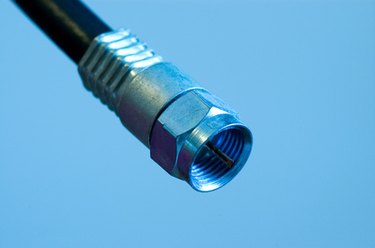
With high-speed Internet's greater bandwidth requirements being put on traditional cable systems, home users are putting much greater demand on coaxial cable than they were in the late 1990s. If coaxial cable deteriorates through exposure to the elements or traffic in the home, television and computer system performance suffers, even to the point of rendering both media inoperable. While coaxial failure is a rather low-tech problem, it's difficult to diagnose without the proper tools.
Step 1
Check signal strength at the source. Trace your cable system back to the point at which the cable enters your local network. Unscrew the coaxial cable from the network side of the box, and attach it to the cable signal meter.
Video of the Day
Step 2
Record the signal strength as a baseline. Your meter reports signal strength in dbmV (decibel-millivolts). Digital meters may automatically switch between orders of magnitude, reporting in the hundreds or thousands of dbmV using the same level of output, so make sure to notice the scale at which the meter is measuring.
Step 3
Reattach the source cable to your cable box, and trace the cable to its first terminating end. This could be either at a split, junction, television or modem.
Step 4
Unscrew the cable from the terminal into which it connects, then attach it to the signal strength meter.
Step 5
Take a measurement of signal strength. Although minor signal deterioration is expected along the cable, your signal strength should be roughly similar to the baseline reading. If it is not, the coaxial cable needs to be replaced.
Step 6
Trace the rest of your cable network, repeating steps 2-5 for each length of coaxial cable on your network. Signal strength will deplete with each passing junction and length of cable, though any large degradation indicates a splitter or cable failure. These failed cables and splitters need to be replaced to maintain signal integrity.
Video of the Day